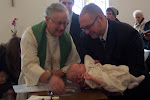Good News at Noon at Good Samaritan Lutheran Church, Las Vegas
This is the day that the Lord has made, let us rejoice and be
glad in it.
Hello, I’m Pastor Jim Slater. I have been leading a Thursday
morning Bible study that, during the season Lent, became a time of Lenten
devotions and a short reflection on a chapter 3, verse 16 passage:
Matthew
3:16 – Baptism
I
Corinthians 3:16 – Our bodies are the temple of the HS
Colossians
3:16 – singing psalms, hymns and spiritual songs that inspire and uplift
I John
3:16 – explored God’s agape, divine love, for us
Today, especially in light of the coronavirus and its
worldwide and local effects, I would like to use an OT verse from prophet Zephaniah 3:16.
On that day it shall be said to Jerusalem: Do
not fear, O Zion; do not let your hands grow weak.
Yesterday, Pastor Don spoke about worry and relieving anxiety
through our faith in Jesus. Likewise, I want to focus on the fear that seems to
grow day by day. Worry, anxiety and fear are very real reactions that all of us
are experiencing.
Today, the prophet Zephaniah speaks
a word of comfort and assurance to us as he did of old to the people of
Jerusalem, “Do not fear.” That message, in forms like “Fear not, and do not be
afraid” occurs at least 116 X. Did I go through the entire Bible and count
them! No, this info comes from a concordance. They are words that are spoken by
God, by prophets of God (like Zephaniah), angels and especially by Jesus
himself.
Chapter 3 of Zephaniah shares God’s
promises of comfort and consolation to those who wait patiently for the Lord in
the midst of their fears of destruction and exile, encouraging the people of
Jerusalem and all Judea to rejoice that the Lord their King is and always will
be with them to save and gather them back in peace, love and service to one
another. This sounds like it can speak to our fears as well during this time of
pandemic and confusion, of sickness and death, of job loss and personal
restrictions.
It is important to be aware that the
hopeful message of “Do not be afraid” does not mean “Do not take this
seriously.” There are too many sad examples of this happening among us. But in
fact, the prophet adds “do not let your hands grow weak.” We have been made
very much aware to constantly wash our hands, to be diligent in not touching
our face, eyes, nose, mouth. We are sanitizing our hands after touching door knobs,
bathroom fixtures and Amazon packages. But the prophet tells us that God wants
us to put our hands to work, that is to answer:
How can I help
What can I do
Who is my neighbor in need
And to never stop raising our hands
in prayer.
In the 1950s, Marjorie Jillson wrote
this poem “Little Flock” which, when set to music, became a hymn of trust,
promise and hope.
1 Have no fear, little flock;
have no fear, little flock,
for the Father has chosen
to give you the kingdom;
have no fear, little flock!
2 Have good cheer, little flock;
have good cheer, little flock,
for the Father will keep you
in his love forever;
have good cheer, little flock!
3 Praise the Lord high above;
praise the Lord high above,
for he stoops down to heal you,
uplift and restore you;
praise the Lord high above!
4 Thankful hearts raise to God;
thankful hearts raise to God,
for he stays close beside you,
in all things works with you;
thankful hearts raise to God!
This
hymn is based on the words of Jesus in Luke 12:32 as he encouraged his
disciples to share the Good News of God’s love and forgiveness and to minister
to the needs of their community. Good Samaritan, the parable and the church,
are fitting examples of what it means to put our hands to work in service to
our Lord and to our neighbors. The Evangelical Lutheran Church in America has a
motto: “God’s work; our hands.” Relieved of worry and fear, we can be the hands
of God, reaching out to a world in turmoil and panic.
Fear
not! How desperately we, and all those around us, need to hear that angelic
message of comfort and hope today. Amen.
